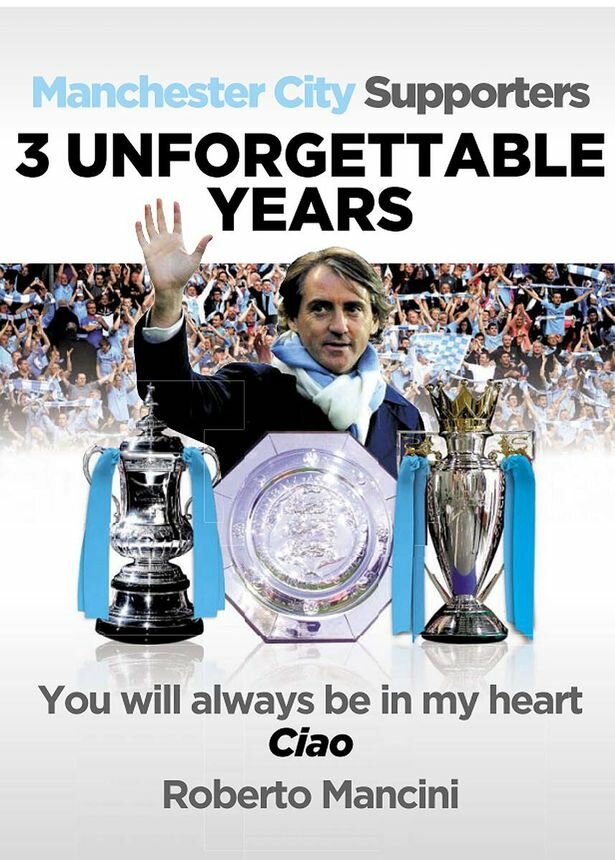For some inexplicable reason I’m still thinking about Roberto Mancini’s sacking by Manchester City. I say inexplicable because few people were shocked by this news when it was first announced, and even if they were, these things are usually forgotten pretty quickly in football.
Mancini was never exactly popular in England. People seemed to find him baffling and irritating. I can’t help thinking if they’d had more exposure to his playing career they might have been slightly more forgiving, at least to begin with. But, he wasn’t an ideal personality for England. He didn’t quite fit the pigeonhole for an Italian manager that requires a slightly jovial and overly emotional personality.
Everyone liked Gianluca Vialli because he was a charmer, but not every Italian can pull that off. If you can’t, the next best thing is to go for the ‘crazy Italian’ approach, like Paulo Di Canio. It’s easy to forget what a figure of fun he was before someone mentioned fascism. And, now that’s died down, we should expect the media to resume interest in his barmy touchline antics. There will be plenty of opportunities for the MOTD pundits to chortle at Paulo’s wild gesticulations on the touchline next season (at least until he’s sacked).
Italians who are a bit more serious about their work, like Claudio Ranieri, or Fabio Cappello, don’t seem to get as much love. It’s like everyone feels a bit cheated because they won’t entertain us. And so, returning to Mancini, despite being a hilariously good footballer, I don’t think the English ever felt there was much to love. He waved his arms a bit sometimes, but also seemed to moan a lot. He wasn’t a fun Italian.
This view was seemingly confirmed by a couple of stories that emerged following his sacking. The first was a Daily Mail feature that revealed the bitterness towards Mancini from within his squad. Many of the City players loathed him, apparently. This story was followed by City’s kit man, Stephen Aziz, tweeting that Mancini was ‘arrogant, vain and self-centred’.
Faced with these confessions, no one was standing up for Mancini and calling him a great guy, and maybe he isn’t much fun to be around, but since when has that been a pre-requisite for being a football manager. Maybe some of City’s players don’t like him for coming down hard on the drinking culture at City. When he arrived there were plenty of stories in the press about drinking sessions featuring Joe Hart and Gareth Barry. You don’t hear too much about that now, but I wonder if some of the players miss the good old days.
The players can moan all they like, and they probably have to protect their zeppelin sized egos from being punctured. After all, it can’t be the players fault – they’re a squad of internationals, good enough for anyone. So, if they coast through the season with a handful of good performances to show in return for their grotesque salaries, it’s Mancini who takes the blame. That’s football, of course, that’s how it works. But, they’ve got a nerve to start moaning to the press as soon as he’s out the door.
As for the kit man, there’s more than a hint of irony in seizing an opportunity to grab some attention whilst accusing Mancini of vanity. Who cares if Mancini didn’t like the kit man. Really, who cares? Maybe the kit man is highly irritating and did Mancini’s head in – we don’t know, and we don’t need to.
Mancini delivered an FA Cup and City’s first Premier League title – their first championship since 1968. He was also the manager that led City to defeat United 6-1 at Old Trafford. You can argue that with City’s resources it was inevitable that they would start to collect silverware sooner or later, and I’d agree with you. There was nothing romantic about City’s success for me, but City’s fans will see things quite differently. It’s not that long ago they were in the third tier and widely regarded as the joke club in England. City will probably go on to win more, but this first Premier League title will forever be associated with Roberto Mancini, and as the first it will be treasured by their fans.
For this reason I thought Mancini’s message to the fans was great. I’d not seen anything like that before – a manager taking out a full page advert. Normally when there’s a rapid exit the departing manager leaves a statement on the club website and that’s it. Yes, the advert was narcissistic, and to some it just reinforced the stereotype of a man whose vanity is out of control.
I’m usually massively cynical about things like this, so maybe it’s poor judgement on my part, but I like that he wanted to communicate directly with the fans and not through the club’s carefully managed PR machine. It showed a basic understanding of what being a fan is about and the importance of moments. It’s moments like destroying your rivals on their own turf that stay with you forever. Despite reaching a disappointing conclusion, City fans have plenty of good memories from Mancini’s time at the club. They probably won’t remember that he didn’t say hello to Stephen Aziz.


